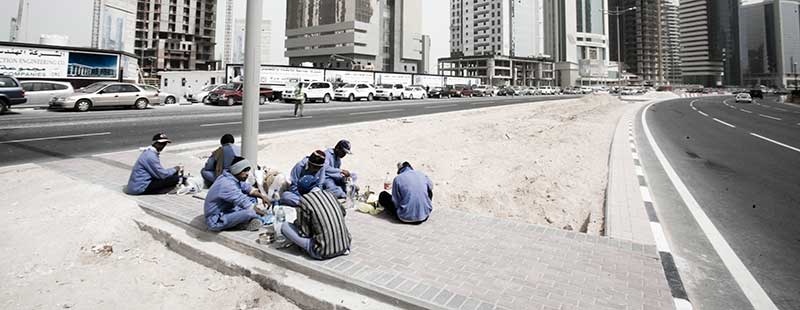A huge push from the World Cup 2022 hosts has failed to convince the International Labour Organisation (ILO) that it has done enough to protect workers from serious abuse.
In our campaign film, Foul Play, we suggested that Qatar’s problem was not just the laws in place to make everybody play fair, but the fact that the referee was asleep on the job. In response to this, the kindest thing that could be said about Qatar’s activity in the last year is that it thinks the referee will spring into action just so long as they get the right laws.
Last year a High Level Mission to Qatar reported back to the ILO, detailing the findings of their visit at the end of 2016. The ILO’s governing body, formed from governments, workers and employers around the world, gave the gulf state one year to demonstrate progress towards eliminating the concerns in the Mission report, including instances of forced labour, lack of freedom of association and of movement (through the kafala system’s exit permit), poor health & safety and squalid accommodation, unpaid wages and the ability of workers to raise complaints and seek remedy from their employers.
The pernicious exit permit, in particular, shifts the balance of power so far away from the workers towards their employer it renders any attempt at providing legal protection pointless: while employers can – legally – trap their workers in Qatar as kafala allows, it’s unlikely that employees will risk incurring their wrath by raising a complaint. Nor, with unions outlawed, is there any way for people to raise their problems in a less personal (and vulnerable) way.
Qatar’s report to the ILO, however, was so determined to be considered happy news it may as well have been delivered by the stork. It announced the abolition of the kafala system and the exit permit, a new electronic wage payment system, new complaint mechanisms for workers and progression ending illegal recruitment fees that leave workers in debt for years. However, if there’s anything true in the report it appears to be buried deep within so much overoptimistic spin that there’s no way of telling fact from fiction.
In particular, it trumpeted the fact that the legislation brought in at the end of last year, known as Law 21, abolished kafala and the exit permit system. Since unions and human rights NGOs like Amnesty have known for months that this isn’t the case, Qatar has either started to believe its own publicity or it wanted to throw some titbits to its army of lobbyists to quote at anyone claiming kafala is still in force. However, workers can still be denied permission to leave by their employers, and the mysterious appeals system remains inscrutable, with no suggestion of on what grounds an appeal might be successful.
“The most outrageous claim in Qatar’s deceptive report to the ILO is that the notorious exit permit system has been repealed. This is a blatant lie – the truth is that workers still have to ask permission from their bosses to leave the country.”
Sharan Burrow, ITUC General Secretary
Claiming that kafala, which basically gave employers ownership rights over workers lives, has been abolished because now employers ‘only’ have total control over workers’ lives instead is rather missing the point of why we wanted it gone in the first place.
An ITUC report challenged Qatar’s statement, and detailed several gaps between the rosy picture painted by Qatar and the reality on the ground. Workers remain unpaid, accommodation remains scandalously filthy and cramped, health & safety is a lottery and passports are still confiscated. Meanwhile, Qatar has provided no evidence of any company falling foul of the law for causing any of these abuses. Qatar’s government attempted to deflect criticism on worker safety with a slew of casualty figures that fly in the face of the few bits of available data it has been possible to extract from the country, suggesting that – for example – only an unlikely 0.06% of all admissions to casualty wards in Qatar are related to workplace injury, and clearly ignoring the 11 deaths and multiple injuries caused by a labour camp fire in 2016.
Illustrating their appalling lack of urgency, Qatar then boasted about a worker hotline that it first promised seven years ago. It also mentioned the deal brokered between the Qatar Supreme Committee (responsible for the 2022 World Cup) and international construction union BWI; while this arrangement is most welcome it benefits only 0.25% of migrant workers in Qatar. Meanwhile, attempts by multinational construction firms to make similar arrangements with BWI have been blocked by the government.
According to the ITUC, Qatar backed up its sunny-side-up report by carrying out an “unprecedented deployment of dozens of lobbyists at the Geneva meeting aiming to shut down any possibility of the UN body’s strongest compliance procedure being applied.” They clearly hoped to persuade the UN labour rights agency to give them a clean bill of health; they will have to try a lot harder.
As Sharan Burrow noted today, “This decision will also increase pressure on FIFA, which has pledged human rights respect in its major events after 2022, but so far failed to use its enormous leverage on Qatar to ensure real reform, and respect for international labour and human rights standards.”
As with previous debates on Qatar, there was broad agreement between the ILO’s Worker and Employer representatives on the need to keep the pressure on Qatar. The British government also supported the EU line of continuing the hold the threat of an investigation until Qatar can prove that it is really taking the action required to end forced labour and widespread abuse of rights. Qatar has been reminded that the only way to make its problems go away is to fix them.

